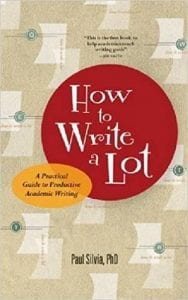In “How to Write a Lot”, the author, Paul J. Silvia, proclaims the message that “productive writers don’t have special gifts or special traits – they just spend more time writing and use this time more efficiently”. In academia, it’s very easy to find excuses as to why you’re not writing enough (and I’ll be the first to admit I’m guilty of many of these): there isn’t enough time, there’s more analysis required first, that surely tomorrow you’ll find the motivation needed to create your very best writing. Silvia begins this book by breaking down these “specious barriers” that hold us back. His arguments are convincing, and quickly unravel the flawed logic that creates such road blocks. Instead, he claims, the secret to success is forming a regular writing schedule and sticking to it. Simple? Sure. Too good to be true? Probably not.
Make no mistake, Silvia doesn’t sugar coat the writing process, in fact he calls it a “grim business, much like repairing a sewer or running a mortuary”. However, publication is the necessary end point of the scientific process, and the communication of research is just as important as the research itself. In light of this unavoidable truth, Silvia outlines several motivational tools to break through bad habits, including useful ways to monitor your writing, and how to develop a support network of like-minded academic writers (who will gently guilt you into maintaining your writing schedule).
In the latter half of the book, there is a brief discussion of style and the importance of clear, concise academic writing, but the reader is directed to other publications for more in-depth guidance in this area. It finishes with some practical tips on both journal article and book writing. Whilst the advice in this section is influenced by Silvia’s experience of publishing in psychology journals (his area of expertise), I still found most of the take away messages useful, if not all the specifics.
Throughout the book, Silvia takes a firm but lighthearted tone, which prevents his advice from becoming too self-aggrandising or preachy. His argument that writing productively really is as simple as sticking to a schedule is certainly convincing; I’ve already blocked out time in my calendar to dedicate to it, no excuses.
by Dr Madeleine Stimpson, Bristol Medical School.


